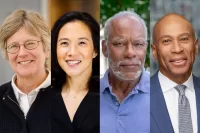
Three survivors of the 1994 genocide against the Tutsi of Rwanda came to Bates this week to openly discuss with students the trauma that’s been woven into their lives and their country’s history for three decades.
The intimate discussions offered students a powerful opportunity “to be confronted with a lived experience that is foreign to them,” said Alexandre Dauge-Roth, professor of French and francophone studies, who welcomed the guests to campus for a three-day event, “Rwanda 30 Years After: Trauma Healing of Genocide Survivors and Intergenerational Trauma.”
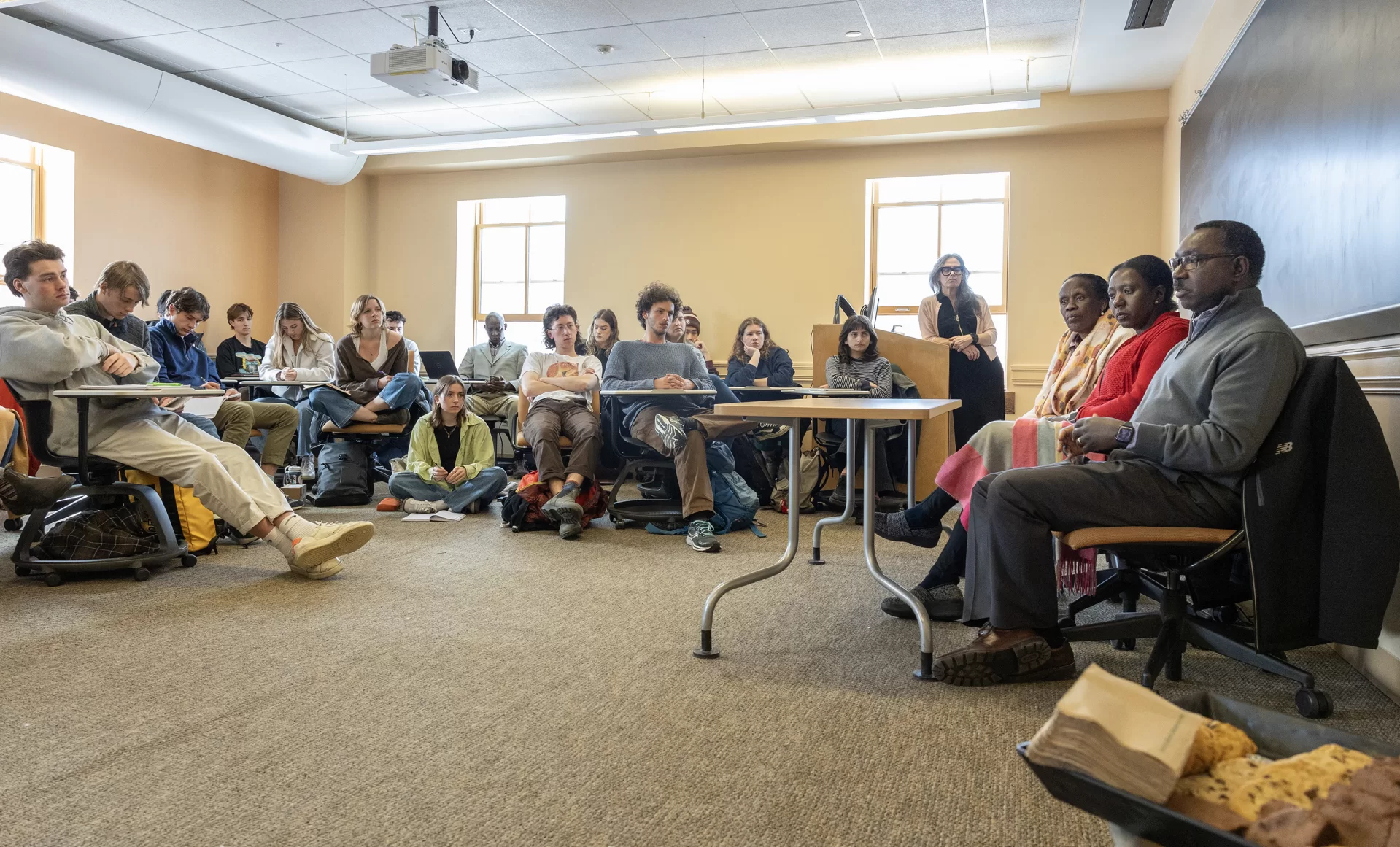
Beginning on April 7, 1994, and lasting 100 days, members of the Hutu ethnic majority, incited by local authorities, militia, and the Rwandan army, murdered upwards of a million people, most exclusively from the Tutsi minority. The massacre left behind open mass graves, family members unable to find and bury their dead, mistrust across the country, and sadness that a land full of natural beauty could be stained with such horror.
“Rwanda is so beautiful, but after ’94, I thought, ‘How could it still be beautiful?’” shared Esther Mujawayo to a gathering of more than 50 students from three different classes held in Roger Williams Hall on Monday.
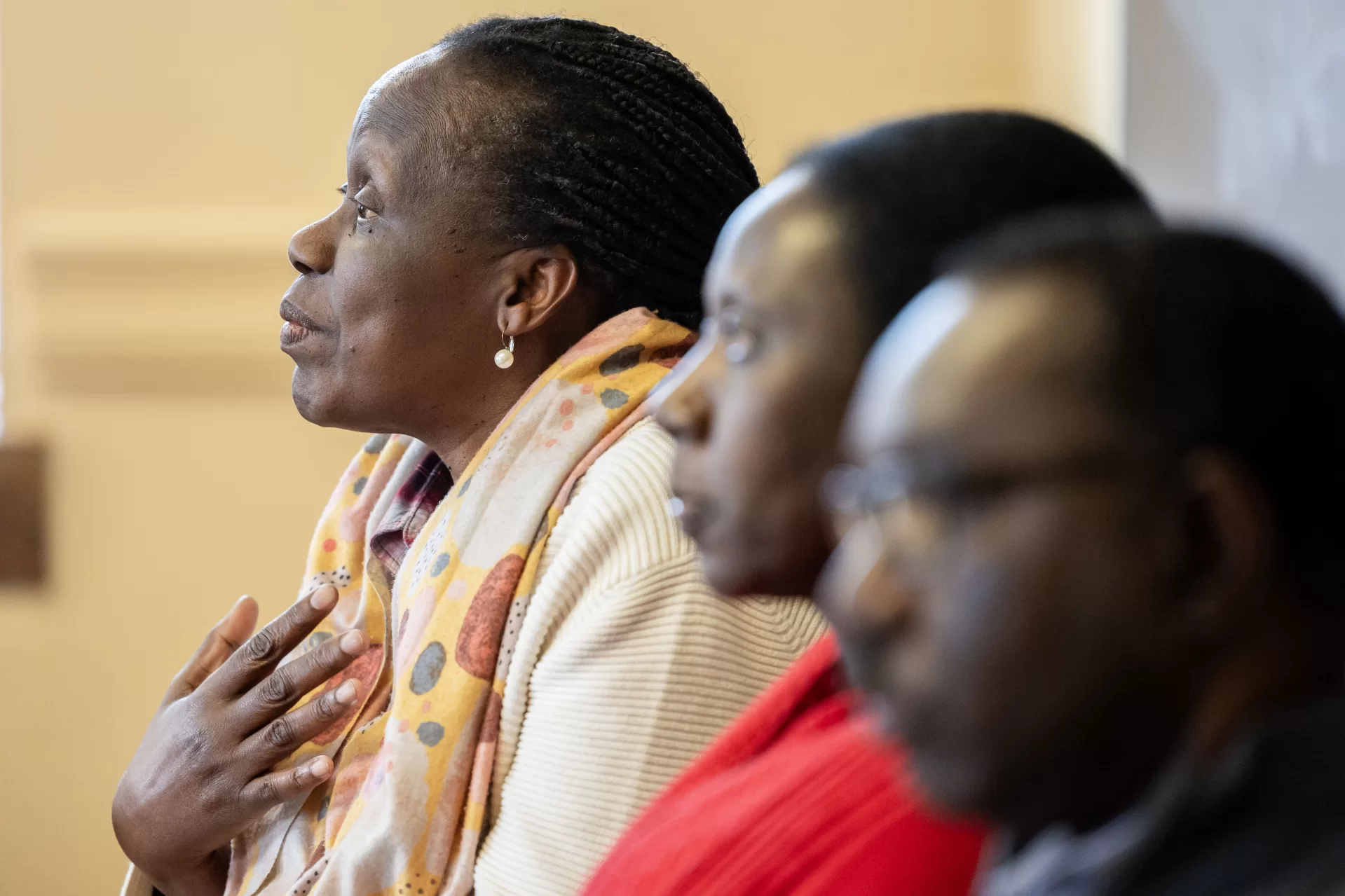
Dauge-Roth is an expert in the literary, cinematic, and testimonial representations of the 1994 genocide and an internationally recognized authority on how educators can effectively teach students about the genocide.
He said that when students “engage and interact with people who have experienced radically different forms of violence and who come from different cultural backgrounds, you can no longer project your values and your judgments. You have to start to really try to understand their perspectives, their aspirations, and sense of history as much as you can, as you engage in a transformative dialogue with them.”
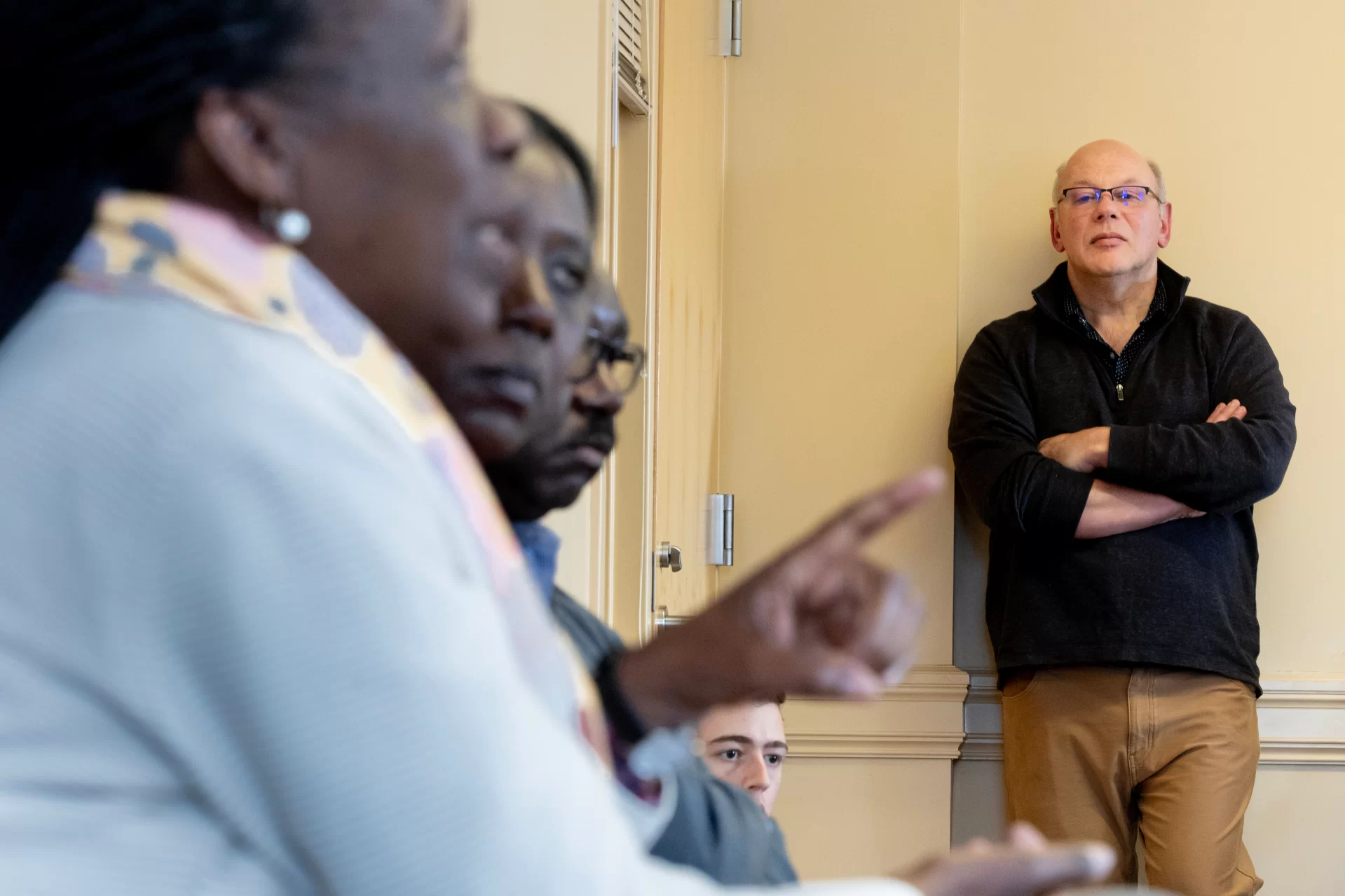
Some of the dialogue surprised the students. Too often, victims are reduced to their sole status of survivor, viewed as passive and without agency, or unable to move beyond their trauma. But the three Rwandan guests, who all played key roles in the reconstruction of their community, sometimes laughed and told jokes as they demonstrated their resilience and continued love for their homeland and people.
“This is why we laugh a lot,” said Mujawayo of Essen, Germany, to students the next day in the course “The Politics of Memory,” taught by Professor of Politics Jim Richter. “We don’t want the killers, the death, to have the last word.”
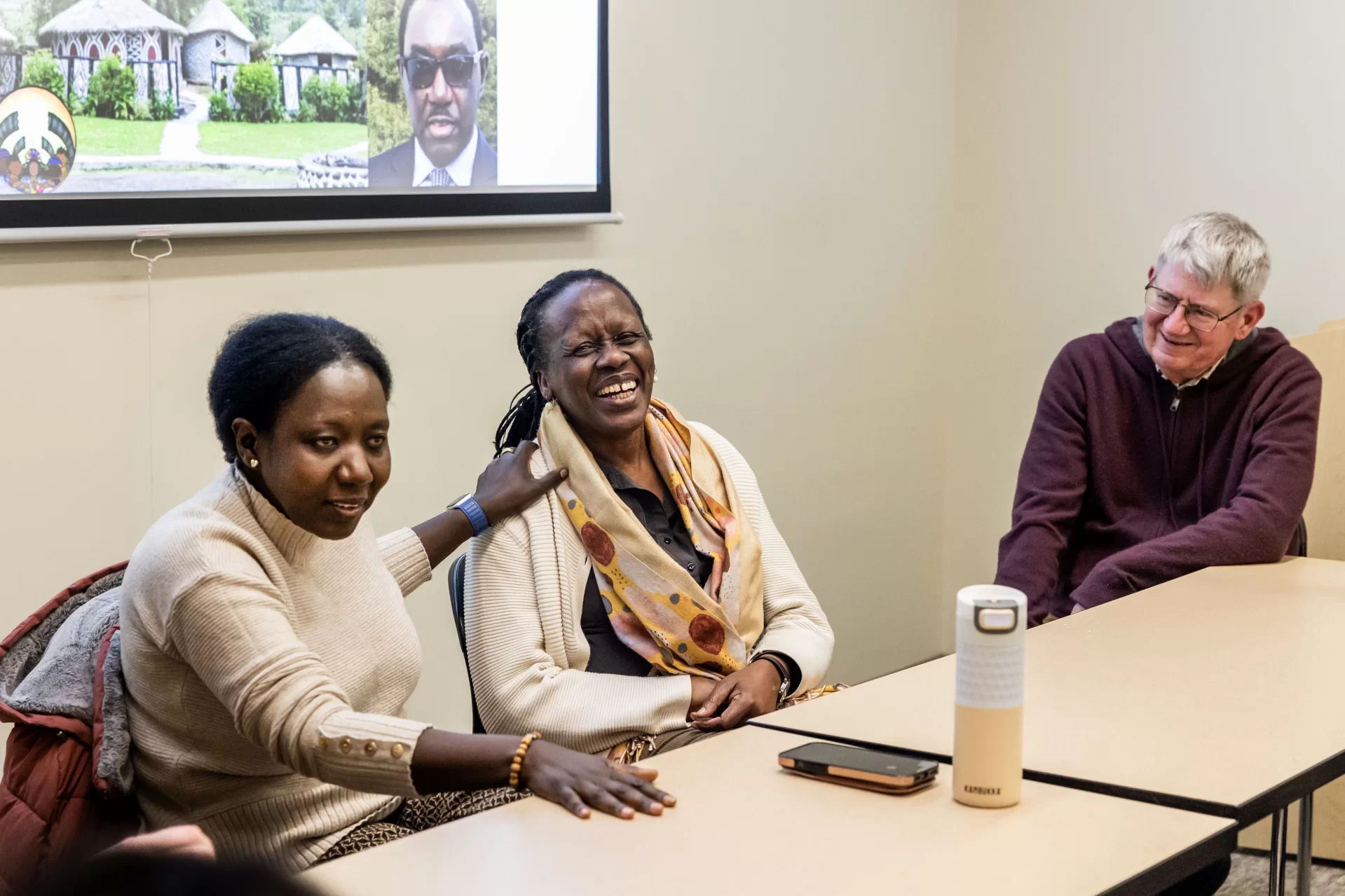
Students dug deep into the two-way conversion, asking their guests — Mujawayo, joined by siblings Jean Bosco Rutagengwa of Amherst, N.H., and Chantal Kayitesi of Dedham, Mass., — how Tutsi survivors balanced the memory of their loved ones who were killed with the trauma that memory brought.
Mujawayo, a psychotherapist and activist who has authored two important testimonies about the genocide, said they’ve tried to shield their children from the bad memories — while also continuing to retell the historic event so it never repeats. “But also, how do you find the right dosage, so that you don’t overwhelm them?” she asked in the gathering of three classes on Monday.
“We tried to shield them from hearing bad stuff,” added Rutagengwa, who helped to form IBUKA (“Remember” in Kinyarwanda) an advocacy association for survivors’ rights and memory after the genocide. “But we also have made sure they know their history.”
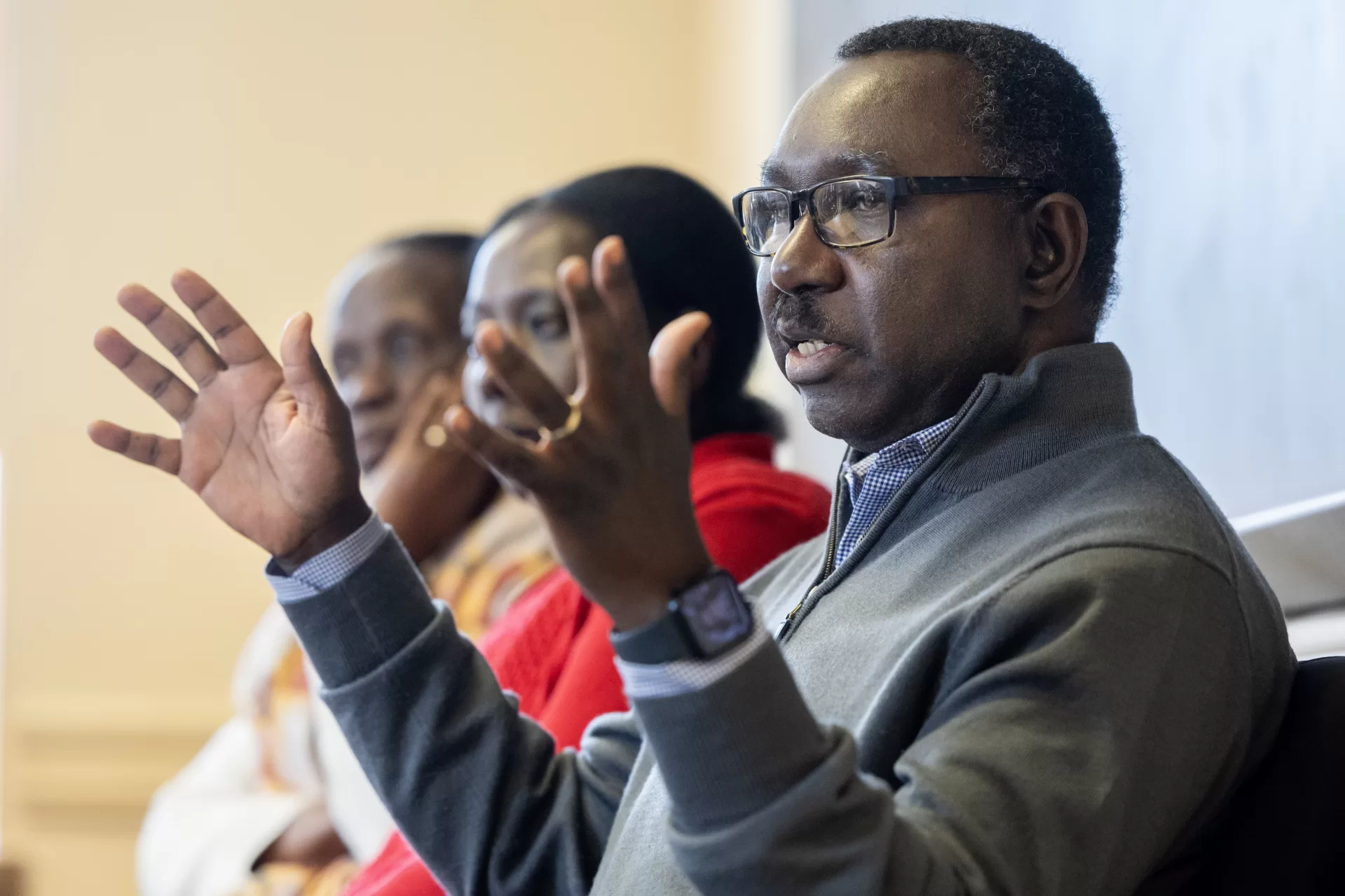
Mujawayo used a metaphor to explain healing and storytelling: “Our story is stinking, but we use this smelling thing, this suffering, to tell a story. If you solely focus on the bad, you only have the stinking. But if you plant something good just next to it, you produce something good.”
A manure pile is a stinking thing, she said, not a place where you want to gather and talk. Mujawayo suggested then to grow something around it, like banana trees, to make it more beautiful. “Grow your bananas,” she said. “Please don’t stay there, in the negativity. Grow something beautiful.”
Bora Lugunda ’25 of Kinshasa, Democratic Republic of Congo, asked the Rwandans how outsiders should best approach interviews with survivors to help document the history of the atrocity.
“It’s not that hard,” Rutagengwa said. “Survivors want to tell their story. It’s good when they share the details, because it helps in the healing process.”
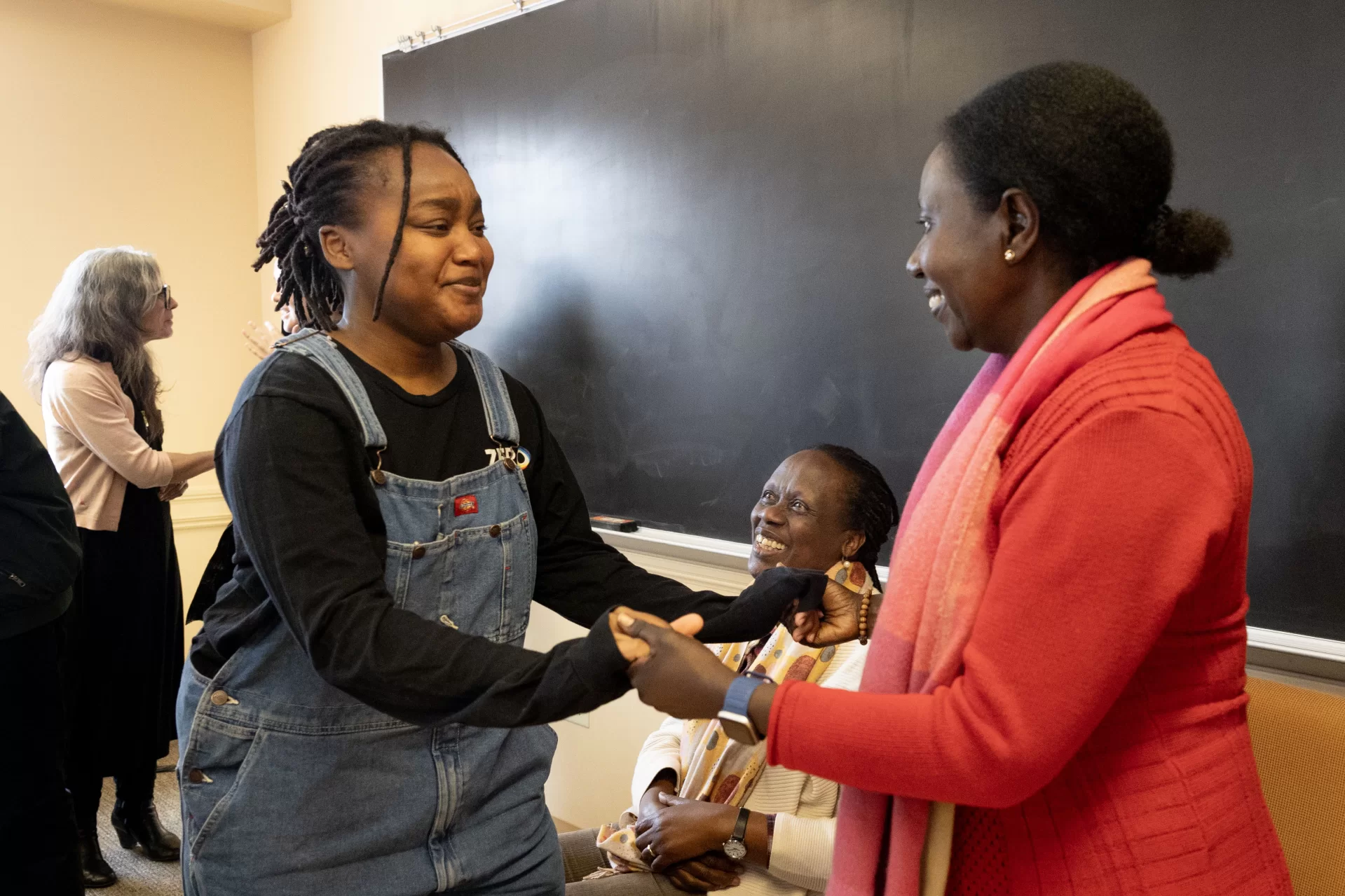
Associate Professor of History Patrick Otim, who next year while on sabbatical in East Africa will pursue research on survivors of the war in Uganda that took place between 1986 and 2008, appreciated this question — and the Rwandans’ responses. Otim said the three guests taught the students in his course on historical methods that historians have to be transparent — and also to conduct interviews with empathy and respect.
“The question for me as a historian is always: How do we treat historical actors like survivors of genocide? When we write history, we have to be respectful of their experiences and portray them in the most accurate way,” Otim said. “I wanted my students to learn how to work with or get information from survivors. This talk was a lesson in oral history.”
On Monday, as the trio talked with students from two French courses and one history course gathered in Roger Williams Hall, they detailed how they’ve lived with the trauma of living through the genocide in frank, raw terms.
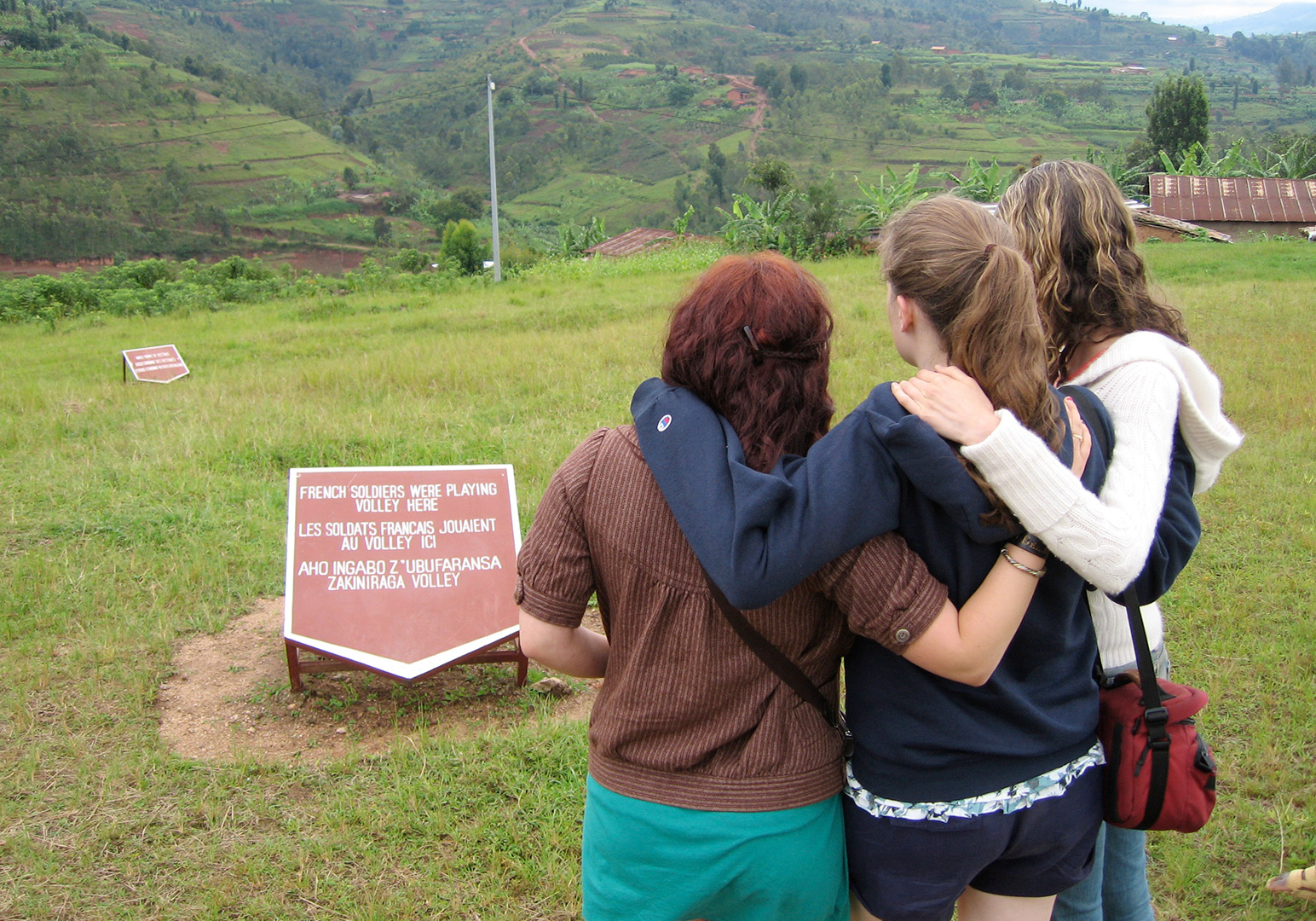
They explained about the Gacaca courts (2002–2012), a system of restorative justice aimed at helping rebuild the country through public confessions and testimonies about the atrocity to put an end to decades of impunity and allow survivors to know the fate of their loved ones.
Mujawayo, who lost her husband, parents, and hundreds of relatives in the genocide, said the open, public discussion about the details of the genocide helped many to find, if not forgiveness, a certain sense of accountability and closure as they were morning their deads.
“After my sister was killed, I at least knew where her body was thrown. So we could bury her in dignity,” she said. “It was not an easy process, finding the latrines where they threw them, but it gives some comfort to restore their dignity.”
After the genocide, Mujawayo helped found AVEGA (Association of Widows and Children of the Genocide Agahozo) with 50 other widows to provide assistance to Tutsi and Hutu widows and children of the genocide. The approximate meaning of “agahozo” is “to dry your tears.”
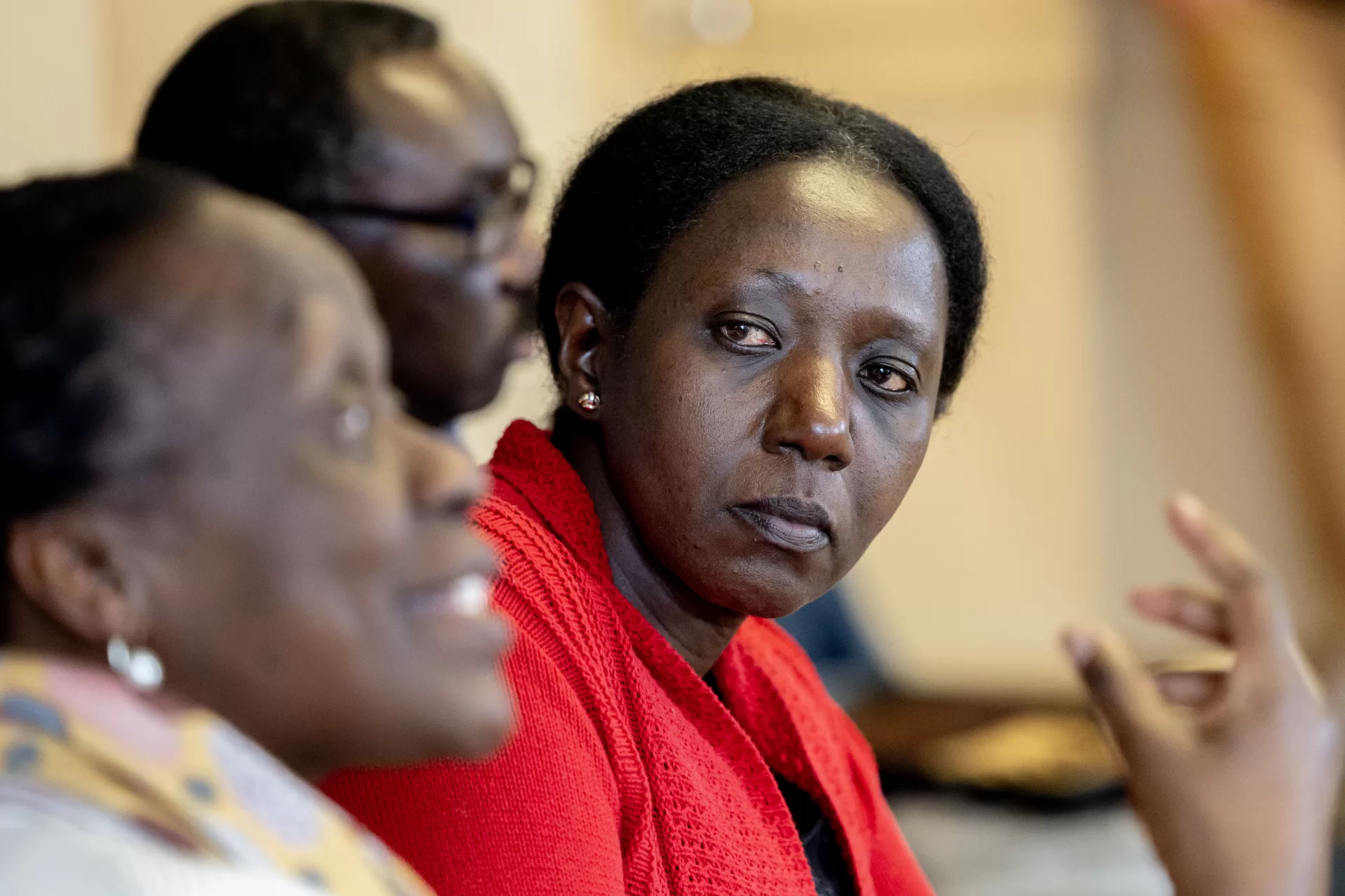
Chantal Kayitesi, who lost her husband, parents, siblings, and relatives, pointed out that the children of the killers too have had a difficult path moving forward by having to accept their intimate connection to the genocide. While many Rwandans want all of their people to move forward, it’s vital to keep retelling the history, “so that it never happens again.”
After the genocide, Kayitesi was also a founding member of AVEGA and has contributed to a collective testimony written by women survivors, Entendez-nous! (Hear Us). “There are always people who try to deny there was a genocide,” she said. “But it really happened.”
In a culture with a deep tradition of oral history, Rutagengwa said that Rwandans have turned to writing down in detail the events of the genocide, so that they can make certain to pass on a true account of it. “We lost great people, but we didn’t want to lose them forever,” he said. “We needed to record who they were. So we made lists of the survivors.”
Dauge-Roth said many students were struck by the compromises that Tutsi survivors were asked to embrace in the reconciliation process, such as moving away from a punitive desire of implementing justice, embracing the restorative justice model of the Gacaca courts, and coping with the return of the vast majority of the perpetrators within their communities as necessary steps to work toward national unity.
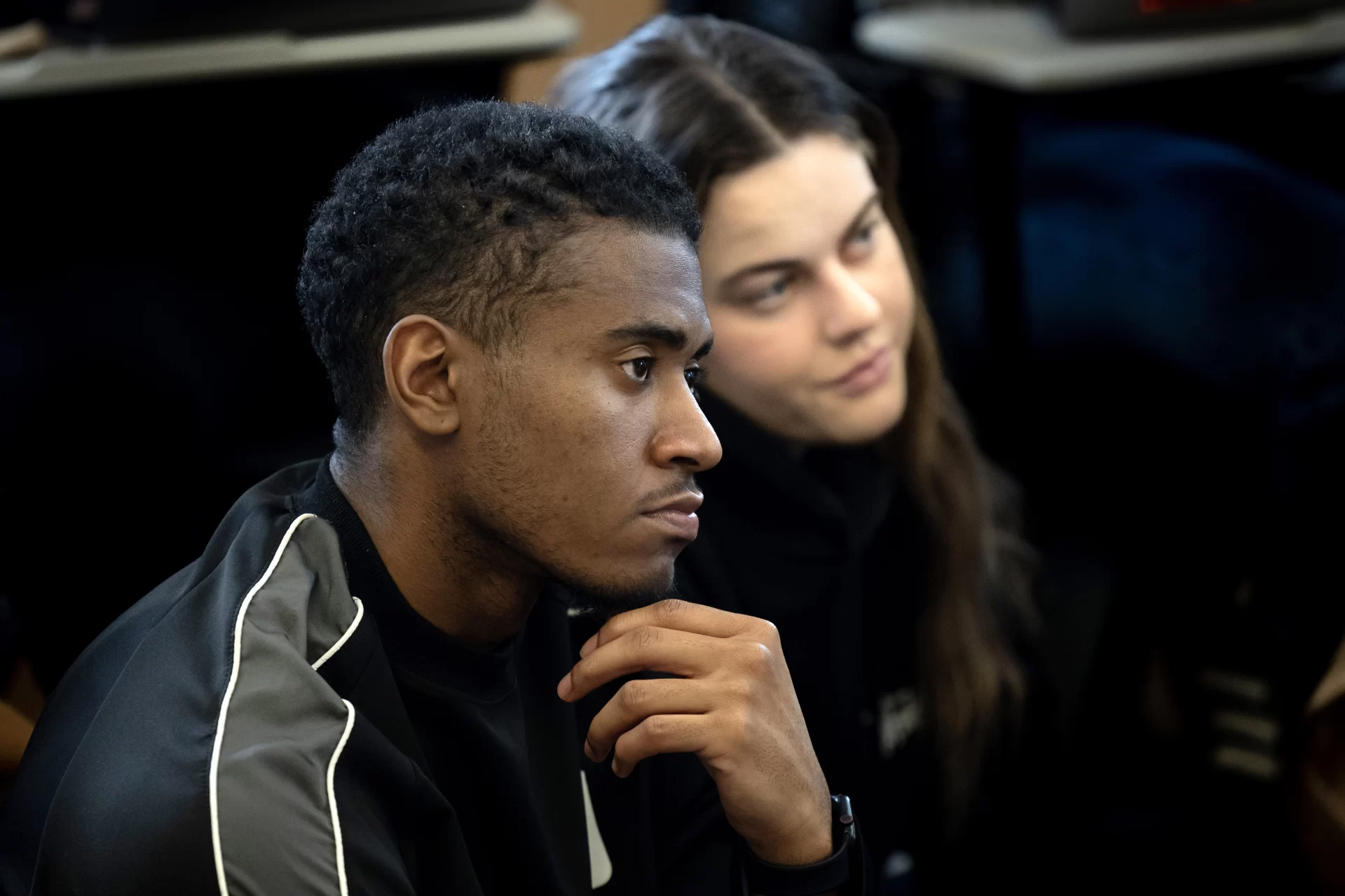
“This was a huge shift for most,” he said. “But they were also in a situation where there was no other choice for them and for the country. The vast majority of them accepted what was demanded from them for their own country and future generations in this historical context without precedent.”
After the visit, Lily Ritch ’25 of Cincinnati, Ohio, gave to Mujawayo and Kayitesi a hand-written thank-you note that read, in part: “This conversation was rough, and I am walking away with a deep respect and admiration for you. I am inspired by your ability to feel and recognize your trauma as a necessary step toward moving forward towards progress and future prevention.”

